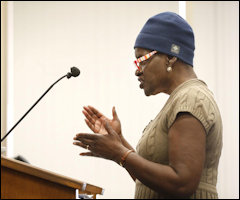The Dream Academy, a Richmond nonprofit, is an adult education center that has worked in a collaborative relationship with the Richmond Public Schools. The academy provides the instruction and pays the school system to review student transcripts and authorize the diplomas. The program has helped more than 250 grown-ups, mostly African-Americans, earn their diplomas.
That relationship now is on the rocks. Virginia Department of Education officials have nixed the agreement on the grounds that the Dream Academy is a private organization. Now the nonprofit has no choice but to pursue private accreditation.
The incident raises issues regarding the legality of of public/private collaboration for adult education anywhere in Virginia.
“Students enrolled in private entities, such as the Dream Academy, are not permitted to take the [Standards of Learning] tests so it is not clear how students would have earned the required verified credit,” wrote Donald Fairheart, VDOE chief of staff, in a Feb. 19 letter to the school district, reports the Richmond Times-Dispatch and WRIC. The letter went on to urge RPS to stop issuing diplomas to Dream Academy students.
It’s not clear from the articles whether the VDOE interpretation is a new one or the department is just getting around to enforcing a law or policy that has long been on the books. The issue surfaced March 4 when Superintendent Jason Kamras informed the School Board that he had asked VDOE if the school district, under heightened scrutiny due to the city’s own issues with transcripts, could enter into the Dream Academy agreement as it had in past years.
Bacon’s bottom line: So, this is the Northam administration’s policy — it is forbidden for the students of private schools to take SOL exams even if the schools pay for the cost of administering the test? It is forbidden for public schools to collaborate with nonprofits to promote adult education? Does this rule apply to private schools focusing on kids with disabilities, too?
How does this make any sense whatsoever? Why wouldn’t the Commonwealth want to encourage closer public-private collaboration — not just for adult students but for disadvantaged students, disabled students or, for that matter, any kind of student? Why wouldn’t the state want to encourage accountability in private education? Whom does it hurt to allow private-school students and home-school students to take the SOLs so parents can evaluate whether their children are meeting basic educational standards?
The ruling is so antithetical to common sense that I find it baffling. Perhaps there is a logic that I cannot discern. I will endeavor to find out more.
Update: I find VDOE’s logic somewhat less baffling thanks to a chat with Charles Pyle, VDOE director of media relations. “It’s not a policy matter,” he says. “It’s a matter of law.”
Under the Code of Virginia, the State Board of Education sets diploma standards that apply to all school systems as well as a system (the SOLs) to assess student progress. The SOLs are geared to the curriculum taught in public schools. Private schools don’t necessarily have the same curricula or the same diploma standards. Adult education programs in public schools adhere to those curricula and standards. Adult students wanting to earn a high school diploma must earn “verified credits” that meet those standards.
As for allowing private school students take the SOLs, says Pyle, the state and public school systems have invested a lot of money in creating a secure online testing system designed to protect the integrity of the tests. Teachers administering the tests must undergo specific training. Furthermore, the state Constitution prohibits public schools from supporting religious schools, which would rule out many private schools from participating in SOLs on separation-of-church-and-state grounds.
Finally, notes Pyle, private schools have their own accrediting board, the Virginia Council for Private Education. You can find his citations from the Code of Virginia here.
OK, I get all that. But I still don’t understand, if private entities meet the standards set by the Virginia Board of Education, and if they are willing to pay their fair share of costs to administer the SOLs, why they can’t.



